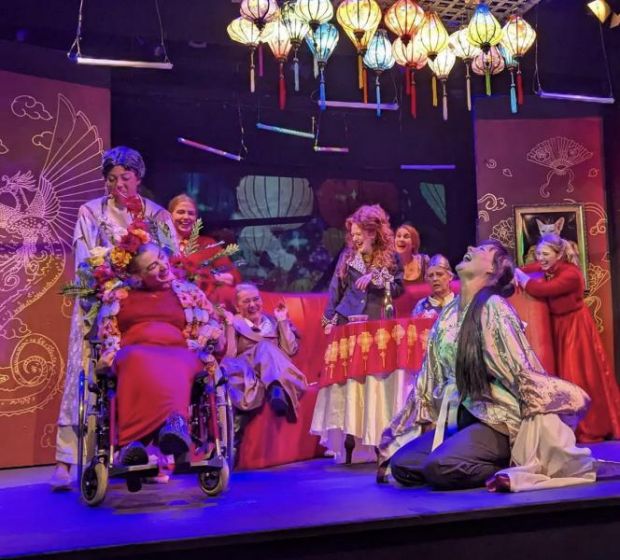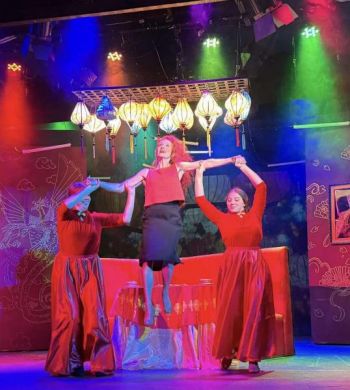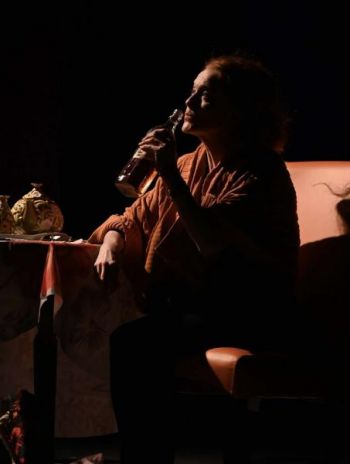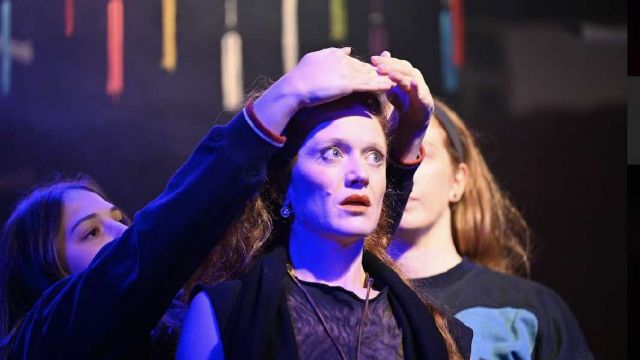Top Girls
Graduate Dramatic Society’s (GRADS) production of Top Girls has been garnering a lot of attention, attracting very healthy houses during its opening weekend at Stirling Theatre. Written by a well-respected author, directed by the award-winning Virginia Moore-Price, and featuring a cast with some stellar actresses, this production should be a safe bet.
The set is among the best we have seen this year. The first scene plays out within the vibrant confines of a booth and its surrounds, in a Chinese restaurant. Complete transitions take us to a teen hidey-hole under stairs, an employment office and finally a cosy, but modest rural kitchen-dining room, designed by the director, who also created the striking lighting plot and sound design, there is little to fault in the design aesthetics.

The story begins, after a short prelude/dance sequence, at a celebration of Marlene’s promotion, attended inexplicably, by famous women from history who give advice as they explore the many restrictions impeding women’s success, the difficulty of blending childbearing and a career and numerous other issues. This scene allows for Merri Ford’s costume design skills to shine, as we enjoy the looks of women from vastly different times and places, as well as enjoying some of the excesses of early 1980s fashion. After this scene, the play becomes more conventional as we meet Marlene’s niece, in reality her daughter, who has been adopted by her sister and explore the life of 1980s career women.
 The woman are, without exception, strong and focused performers. Solonje Burns shines as catalyst character Marlene, in an excellent anchor performance and a character in whom we are invested. Suzannah Churchman demands attention as forthright Scottish adventurer Isabella Bird and is very sympathetic as Marlene’s sister Joyce, very much “left behind” where they grew up. The final scene between these two women is simply excellent.
The woman are, without exception, strong and focused performers. Solonje Burns shines as catalyst character Marlene, in an excellent anchor performance and a character in whom we are invested. Suzannah Churchman demands attention as forthright Scottish adventurer Isabella Bird and is very sympathetic as Marlene’s sister Joyce, very much “left behind” where they grew up. The final scene between these two women is simply excellent.
In smaller roles, Jenny Howard is strong as rarely spoken Dull Gret, and brings an interesting point as Mrs Kidd, a woman resentful of Marlene’s promotion over her husband. Emilia Lawonski is excellent as Griselda, accepting and unaware of her own oppression and very convincing as Angie, an underachiever in her mid-teens, seemingly lacking in intelligence and confidence. Georgina Teakle’s Win is well played, while Giordana Marra inhabits pre-teen Kit, with bright conviction.
Sarah Plummer brings cynicism and humour to Pope Joan; Kelly Cleary gives grace and credence to Lady Nijo. Vicky Williams provides solid support as Nell and Jeanine, while Amanda Langton plays characters created especially for this production of the play, Her (who is obviously a portrayal of Frida Kahlo) and Woman, both of which provide for and speak to disabled representation and the extra impediments these women face in their efforts to be “top girls”.

Another addition to this production is dance sequences, choreographed by Amanda Watson, the meaning of which are a little obscure.
Despite the work in this show, it is dividing audiences, with 20% or more choosing to leave at interval (or during the show), and people describing it as ‘hard to watch’.
I suspect multiple aspects are at play. The writing style of overlapping dialogue, well executed as it is, can be challenging. The subject matter at times is confronting, and the language is very ripe (with no warning given). The clear references to early ‘80s British politics might be beyond our current audiences’ experience and interest.
Conversely there are audience members raving about this one, with great passion.
If you like your theatre interesting and controversial and enjoy a good debate with your companions, this is a fabulous choice.
Kimberley Shaw
Subscribe to our E-Newsletter, buy our latest print edition or find a Performing Arts book at Book Nook.

